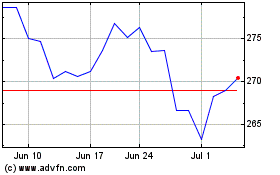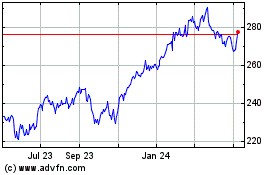Justice Department Investigating Visa Over Debit-Card Practices -- Update
March 19 2021 - 11:50AM
Dow Jones News
By AnnaMaria Andriotis and Brent Kendall
The Justice Department is investigating whether Visa Inc. is
engaging in anticompetitive practices in the debit-card market,
according to people familiar with the matter.
The department's antitrust division has been gathering
information and asking whether Visa, the largest U.S. card network,
has limited merchants' ability to route debit-card transactions
over card networks that are often less expensive, the people said.
Many of the department's questions have focused on online
debit-card transactions, but investigators have asked about
in-store issues as well, the people said.
The probe highlights the important role of the so-called network
fees that are invisible to consumers, lucrative for card companies,
but a weight on merchants, who often pass on the fees in the form
of higher prices to customers.
It comes as Justice Department antitrust enforcers across
administrations have placed an emphasis on scrutinizing
digital-marketplace activities, including in the financial sector,
and on investigating the business practices of dominant firms.
In the new probe, the department is considering whether Visa's
practices are allowing it to maintain a dominant market share
unlawfully, the people said.
A Visa spokesman declined to comment. The Justice Department
didn't immediately comment.
Antitrust investigators have asked questions beyond just the
debit-card routing issue, some of the people said. The department
also has asked about Mastercard Inc.'s role in the debit-card
marketplace, and whether financial-technology firms are real
competitors to Visa and Mastercard, one of the people said.
A Mastercard spokesman didn't provide a comment.
The new civil investigation, launched in recent weeks, follows
on the heels of the department's investigation of Visa's proposed
acquisition of financial-technology firm Plaid Inc., the people
said. The department sued Visa in November over the Plaid deal,
alleging that the acquisition would allow Visa to unlawfully
maintain a monopoly in online debit, where the department said it
holds a roughly 70% market share.
Plaid was developing an innovative, cheaper payment technology
that could have been a threat to Visa, the government alleged. Visa
called the lawsuit misguided, saying Plaid wasn't in fact a
competitor.
The companies dropped the deal in January, citing the potential
length and complexity of litigation.
How debit-card transactions are routed is a longstanding point
of contention between merchants and card companies. The Durbin
amendment, a part of the 2010 Dodd-Frank Act, requires that
merchants have the ability to choose from at least two unaffiliated
debit-card networks to route transactions.
Merchants have for years alleged that they are often unable to
route online debit-card purchases over smaller networks, such as
Shazam or NYCE, when Visa or Mastercard's name is on the front of a
card. The merchants say that as a result, they often end up paying
higher network fees compared with what they would pay to
lesser-known networks.
The Justice Department is seeking information about the
financial incentives that Visa provides to banks that issue cards
on its network, according to one of the people familiar with the
matter. It is looking at whether those incentives encourage banks
to not enable routing on other networks, the person said.
The DOJ also has asked about debit-card routing practices tied
to newer payment methods, one of the people said. That includes
when debit cards are used with mobile wallets like Apple Pay and
separately when in-store customers pay by tapping debit cards on
payment terminals rather than inserting them.
Separately, the Federal Trade Commission has been investigating
Visa and Mastercard over debit-card routing. Sen. Richard Durbin
and Rep. Peter Welch also raised the issue in a letter to the
Federal Reserve last summer.
Write to AnnaMaria Andriotis at annamaria.andriotis@wsj.com and
Brent Kendall at brent.kendall@wsj.com
(END) Dow Jones Newswires
March 19, 2021 11:35 ET (15:35 GMT)
Copyright (c) 2021 Dow Jones & Company, Inc.
Visa (NYSE:V)
Historical Stock Chart
From Mar 2024 to Apr 2024

Visa (NYSE:V)
Historical Stock Chart
From Apr 2023 to Apr 2024
